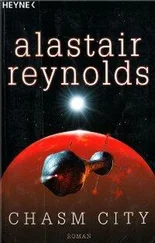Alastair Reynolds - Zima Blue
Здесь есть возможность читать онлайн «Alastair Reynolds - Zima Blue» весь текст электронной книги совершенно бесплатно (целиком полную версию без сокращений). В некоторых случаях можно слушать аудио, скачать через торрент в формате fb2 и присутствует краткое содержание. Год выпуска: 2005, ISBN: 2005, Издательство: PS Publishing, Жанр: Фантастика и фэнтези, на английском языке. Описание произведения, (предисловие) а так же отзывы посетителей доступны на портале библиотеки ЛибКат.
- Название:Zima Blue
- Автор:
- Издательство:PS Publishing
- Жанр:
- Год:2005
- ISBN:1-904619-33-9
- Рейтинг книги:4.5 / 5. Голосов: 2
-
Избранное:Добавить в избранное
- Отзывы:
-
Ваша оценка:
- 100
- 1
- 2
- 3
- 4
- 5
Zima Blue: краткое содержание, описание и аннотация
Предлагаем к чтению аннотацию, описание, краткое содержание или предисловие (зависит от того, что написал сам автор книги «Zima Blue»). Если вы не нашли необходимую информацию о книге — напишите в комментариях, мы постараемся отыскать её.
Zima Blue — читать онлайн бесплатно полную книгу (весь текст) целиком
Ниже представлен текст книги, разбитый по страницам. Система сохранения места последней прочитанной страницы, позволяет с удобством читать онлайн бесплатно книгу «Zima Blue», без необходимости каждый раз заново искать на чём Вы остановились. Поставьте закладку, и сможете в любой момент перейти на страницу, на которой закончили чтение.
Интервал:
Закладка:
“No,” Zima agreed. “And the AM certainly wouldn’t attach any significance to that one happy combination of circumstances. A single deviation wouldn’t affect its predictive model to any significant degree. It would still say ‘red wine’ the next time you asked.”
I felt an uncomfortable tingle of understanding. “But human memory wouldn’t work that way.”
“No. It would latch onto that one exception and attach undue significance to it. It would amplify the attractive parts of the memory of that afternoon and suppress the less pleasant parts: the fly that kept buzzing in your face, your anxiety about catching the boat home, and the birthday present you knew you had to buy in the morning. All you’d remember was that golden glow of well-being. The next time, you might well choose white, and the time after. An entire pattern of behaviour would have been altered by one instance of deviation. The AM would never tolerate that. You’d have to go against its advice many, many times before it grudgingly updated its model and started suggesting white rather than red.”
“All right,” I said, still wishing we could talk about Zima rather than me. “But what practical difference does it make whether the artificial memory is inside my head or outside?”
“All the difference in the world,” Zima said. “The memories stored in the AM are fixed for eternity. You can query it as often as you like, but it will never enhance or omit a single detail. But the implants work differently. They’re designed to integrate seamlessly with biological memory, to the point where the recipient can’t tell the difference. For that very reason they’re necessarily plastic, malleable, subject to error and distortion.” “Fallible,” I said. “But without fallibility there is no art. And without art there is no truth.”
“Fallibility leads to truth? That’s a good one.”
“I mean truth in the higher, metaphoric sense. That golden afternoon? That was the truth. Remembering the fly wouldn’t have added to it in any material sense. It would have detracted it from it.”
“There was no afternoon, there was no fly,” I said. Finally, my patience had reached breaking point. “Look, I’m grateful to have been invited here. But I thought there might be a little more to this than a lecture about the way I choose to manage my own memories.”
“Actually,” Zima said, “there was a point to this after all. And it is about me, but it’s also about you.” He put down the glass. “Shall we take a little walk? I’d like to show you the swimming pool.”
“The sun hasn’t gone down yet,” I said.
Zima smiled. “There’ll always be another one.”
He took me on a different route through the house, leaving by a different door than the one we’d come in by. A meandering path climbed gradually between white stone walls, bathed now in gold from the lowering sun. Presently we reached the flat plateau I’d seen on my approach in the conveyor. The things I’d thought were viewing stands were exactly that: terraced structures about thirty metres high, with staircases at the back leading to the different levels. Zima led me into the darkening shadow under the nearest stand, then through a private door that led into the enclosed area. The blue panel I’d seen during the approach turned out to be a modest rectangular swimming pool, drained of water.
Zima led me to the edge.
“A swimming pool,” I said. “You weren’t kidding. Is this what the stands are all about?”
“This is where it will happen,” Zima said. “The unveiling of my final work of art, and my retirement from public life.”
The pool wasn’t quite finished. In the far corner, a small yellow robot glued ceramic tiles into place. The part near us was fully tiled, but I couldn’t help noticing that the tiles were chipped and cracked in places. The afternoon light made it hard to be sure—we were in deep shadow now—but their colour looked to be very close to Zima Blue.
“After painting entire planets, isn’t this is a bit of a letdown?” I asked.
“Not for me,” Zima said. “For me this is where the quest ends. This is what it was all leading up to.”
“A shabby-looking swimming pool?”
“It’s not just any old swimming pool,” he said.
He walked me around the island, as the sun slipped under the sea and the colours turned ashen.
“The old murals came from the heart,” Zima said. “I painted on a huge scale because that was what the subject matter seemed to demand.”
“It was good work,” I said. “It was hack work. Huge, loud, demanding, popular, but ultimately soulless. Just because it came from the heart didn’t make it good.” I said nothing. That was the way I’d always felt about his work as well: that it was as vast and inhuman as its inspiration, and only Zima’s cyborg modifications leant his art any kind of uniqueness. It was like praising a painting because it had been done by someone holding a brush between their teeth.
“My work said nothing about the cosmos that the cosmos wasn’t already capable of saying for itself. More importantly, it said nothing about me. So what if I walked in vacuum, or swam in seas of liquid nitrogen? So what if I could see ultraviolet photons, or taste electrical fields? The modifications I inflicted upon myself were gruesome and extreme. But they gave me nothing that a good telepresence drone couldn’t offer any artist.”
“I think you’re being a little harsh on yourself,” I said.
“Not at all. I can say this now because I know that I did eventually create something worthwhile. But when it happened it was completely unplanned.”
“You mean the blue stuff?”
“The blue stuff,” he said, nodding. “It began by accident: a misapplication of colour on a nearly-finished canvas. A smudge of pale, aquamarine blue against near-black. The effect was electric. It was as if I had achieved a short-circuit to some intense, primal memory, a realm of experience where that colour was the most important thing in my world.”
“What was that memory?”
“I didn’t know. All I knew was the way that colour spoke to me, as if I’d been waiting my whole life to find it, to set it free.” He thought for a moment. “There’s always been something about blue. A thousand years ago Yves Klein said it was the essence of colour itself: the colour that stood for all other colours. A man once spent his entire life searching for a particular shade of blue that he remembered encountering in childhood. He began to despair of ever finding it, thinking he must have imagined that precise shade, that it could not possibly exist in nature. Then one day he chanced upon it. It was the colour of a beetle in a museum of natural history. He wept for joy.”
“What is Zima Blue?” I asked. “Is it the colour of a beetle?”
“No,” he said. “It’s not a beetle. But I had to know the answer, no matter where it took me. I had to know why that colour meant so much to me, and why it was taking over my art.”
“You allowed it to take over,” I said.
“I had no choice. As the blue became more intense, more dominant, I felt I was closer to an answer. I felt that if only I could immerse myself in that colour, then I would know everything I desired to know. I would understand myself as an artist.”
“And? Did you?”
“I understood myself,” Zima said. “But it wasn’t what I expected.”
“What did you learn?”
Zima was a long time answering me. We walked on slowly, me lagging slightly behind his prowling muscular form. It was getting cooler now and I began to wish I’d had the foresight to bring a coat. I thought of asking Zima if he could lend me one, but I was concerned not to derail his thoughts from wherever they were headed. Keeping my mouth shut had always been the toughest part of the job.
Читать дальшеИнтервал:
Закладка:
Похожие книги на «Zima Blue»
Представляем Вашему вниманию похожие книги на «Zima Blue» списком для выбора. Мы отобрали схожую по названию и смыслу литературу в надежде предоставить читателям больше вариантов отыскать новые, интересные, ещё непрочитанные произведения.
Обсуждение, отзывы о книге «Zima Blue» и просто собственные мнения читателей. Оставьте ваши комментарии, напишите, что Вы думаете о произведении, его смысле или главных героях. Укажите что конкретно понравилось, а что нет, и почему Вы так считаете.












